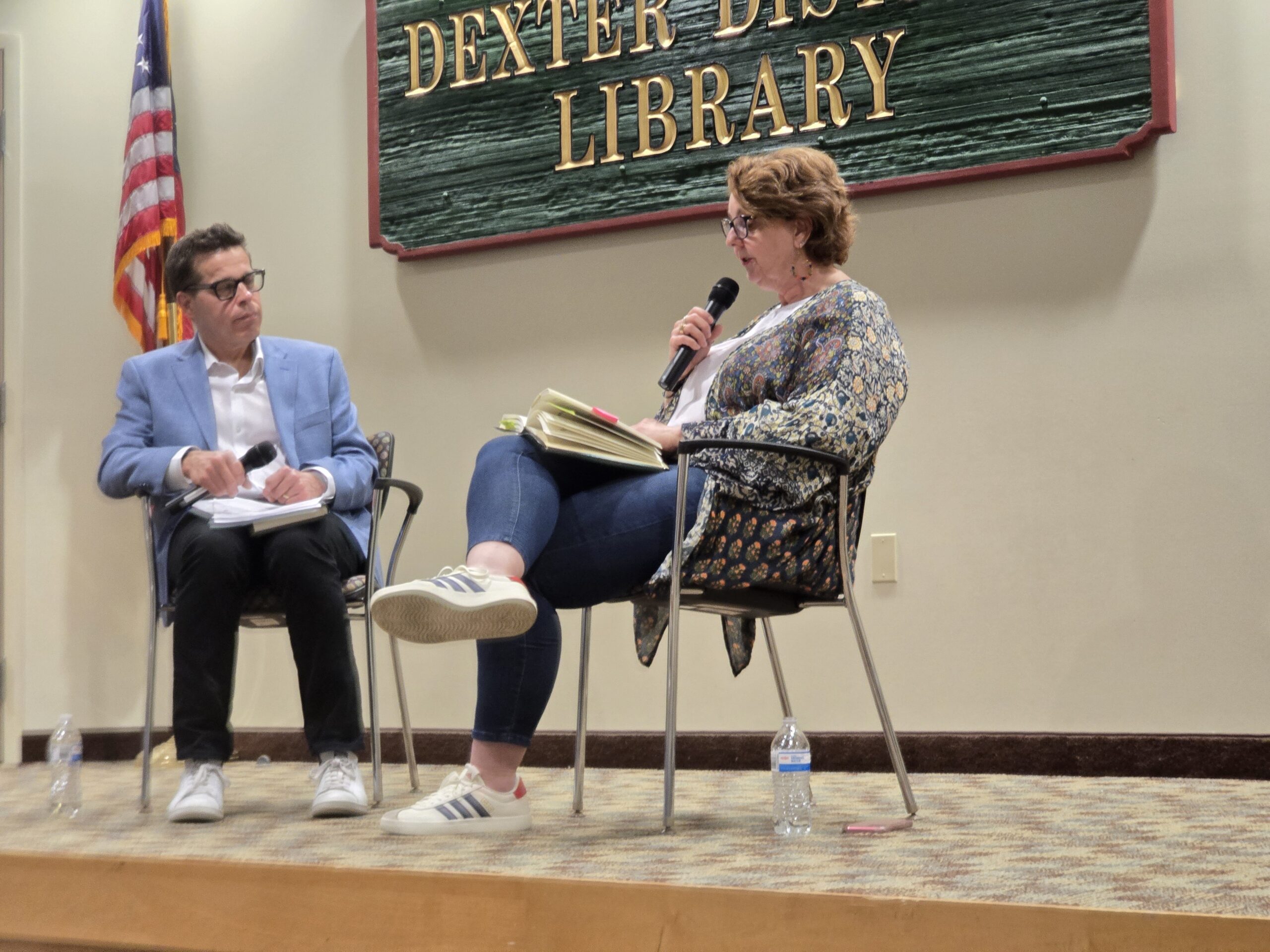“When you layer the misogyny of the music industry on top of the misogynistic framework around being a widow, it’s really quite something.”
Photo: Moderator Rich Fahle and Lori Tucker-Sullivan at the Dexter District Library, April 23, 2025. Photo by Doug Marrin.
On April 23, acclaimed writer and former Dexter resident Lori Tucker-Sullivan returned to her hometown to present her debut book, I Can’t Remember If I Cried: Rock Widows on Life, Love and Legacy, in an evening of powerful reflection and conversation at the Dexter District Library. The event, held in the library’s lower-level meeting room, drew a crowd of friends, fans, and community members who gathered to hear Tucker-Sullivan share personal stories behind the book in an interview-style talk with Chelsea resident and media expert Rich Fahle, former producer of PBS Books.
The book, a unique blend of memoir, biography, and cultural commentary, profiles the widows and partners of some of rock music’s most iconic—and often troubled—figures. Tucker-Sullivan weaves their stories with her own journey of grief after the death of her husband, Kevin, in 2010.
Tucker-Sullivan lived in Dexter for 26 years with Kevin and their two children. The book was born from her own loss and a longing to reconnect with a long-held passion for music journalism. “I had kind of finally come to terms with this idea that something was missing in my life… I wanted to be a music writer. That’s what I had always wanted to be since I was a young teen,” she said, reflecting on the decision to go back to school before Kevin’s diagnosis and how his encouragement helped fuel her later work.

Her return to writing merged with a fascination for how women like Yoko Ono, Sandy Chapin, and Gloria Jones managed the legacy of their famous partners. “I started thinking, there were other women like that. There have to be and they are my connection. They’re going to be my path forward. And they did. They became that,” Tucker-Sullivan said.
The book’s title, I Can’t Remember If I Cried, is a lyric from Don McLean’s song “American Pie,” which mourns “the day the music died” in the 1959 plane crash that killed Buddy Holly, Ritchie Valens, and the Big Bopper.
The book’s title nods to Maria Elena Holly, whom Tucker-Sullivan calls “the very first rock widow.” The wife of Buddy Holly, Maria Elena, became instrumental in preserving his legacy. “She really started the whole thing with that responsibility falling to the surviving wife,” Tucker-Sullivan explained.
Fahle noted the remarkable access and trust Tucker-Sullivan earned from the women she profiled. Despite the painful memories many carried, most were eager to share their stories. One exception, Donna Allman, widow of Duane Allman, wrote a heartfelt rejection. “I was 18 when I met him, 19 when we got married, 20 when we had our daughter, 21 when he kicked me out of the house, and 22 when I was responsible for burying him, and I just did not want to go back there.” Tucker-Sullivan recalled from Allman’s letter.
The women featured in I Can’t Remember If I Cried shared a wide range of experiences, shaped by both intimate loss and the isolating spotlight of fame. Some, like Gloria Jones—singer and partner of Marc Bolan, frontman for T. Rex—carried the added weight of tragedy and public blame. Jones had been driving the car in the accident that killed Bolan, and decades later, she still faced cruel messages online.
Others, like Sandy Chapin, widow of singer-songwriter Harry Chapin, struggled with the burden of grieving in public spaces where their partner’s memory lived on through fans and monuments.
“When I go there, it isn’t a place just for me to be with Harry,” Chapin said of her late husband’s grave. “Sometimes I just want to be here with Harry. It’s a very public place, though.” Her words reflect the recurring tension many of the women face—balancing their private sorrow with a public legacy that doesn’t always leave room for personal healing.
Each widow profiled also highlights the complexities of preserving legacy, often without financial or emotional support. Tucker-Sullivan shared how many women found themselves in legal battles or judged by fans for how they managed their partners’ memory. “They don’t have the ability to [retreat]. And I think they fear that if they stand back, then people will forget about them,” she said. “They’re judged on everything they do and everything they don’t do.”
The book’s structure—divided into “Life,” “Love,” and “Legacy”—came from this desire to show the progression of grief and purpose. “Once I made that decision, they all just seemed to fit,” she said.
The emotional depth of the evening peaked when Tucker-Sullivan read from the chapter about Crystal Zevon, ex-wife of singer Warren Zevon. Despite their turbulent marriage, Crystal fulfilled Warren’s request to write his biography after his death. “Reading his journals… it felt like him beating me up again,” she recounted. “But now I’m so glad I did, because it was like Warren’s one last confession, one last request for forgiveness.”
“Forgiveness at this point isn’t for him, it’s for me,” Tucker-Sullivan, quoting Crystal Zevon. “It’s the best thing to do.”
The author shared her favorite quote from her interviews. It came from Catherine Mayer, widow of Andy Gill (Gang of Four). “When you layer the misogyny of the music industry on top of the misogynistic framework around being a widow, it’s really quite something.”
Tucker-Sullivan’s deep empathy and personal insight allowed her to form meaningful connections with the women she interviewed—many of whom had never shared their stories publicly. As both a writer and a fellow widow, she created a space where grief, memory, and legacy could be explored with honesty and care.
I Can’t Remember If I Cried is available at Dexter’s The Fox and the Feather, independent booksellers, and online.






 8123 Main St Suite 200 Dexter, MI 48130
8123 Main St Suite 200 Dexter, MI 48130


